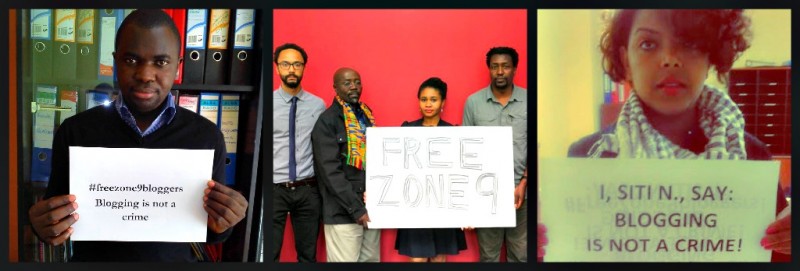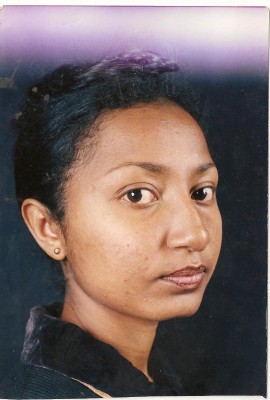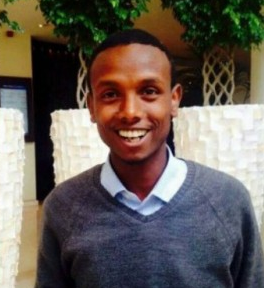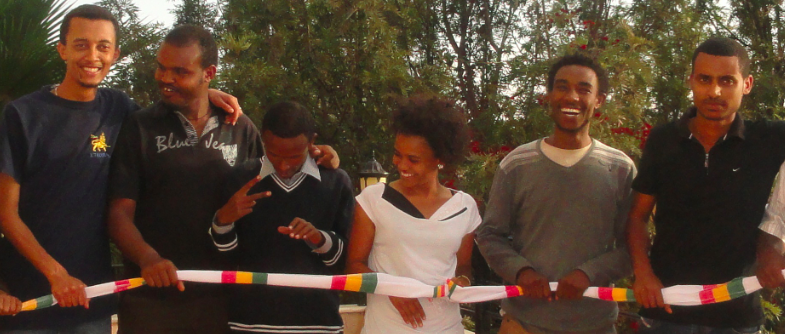
FreeZone9 Tumblr. Images reused with permission.
#FreeZone9Bloggers. It feels like we've written this a thousand times already. But they are still in jail. And now they have been charged with terrorism.
Six of these men and women worked together to create Zone9, a blogging collective bearing the tagline, “We blog because we care.” They did this in their native Ethiopia, a country where state media dominate the information economy and reputable press freedom groups have been driven out on accusations of supporting terrorist activity.
In both Amharic and English, the bloggers wrote about some of the country's most pressing social and economic issues. They wrote about art and literature. As a collective, they began to write and speak about their nation's constitution. The Zone9ers believed this was the key: If citizens could hold their government accountable to the laws of its own land, the country's political structures and civic fabric could become stronger.

Journalist Reeyot Alemu, jailed in Ethiopia since 2011. Photo used with permission.
Arrested on April 25 and 26, 2014, six of the Zone9 bloggers and three Ethiopian journalists were brought before a judge again and again – five times at least. Each time, police investigators asked for more time to accrue evidence by making meticulous searches through online accounts, computer hard drives, and even paper documents taken from homes of the accused.
For three months, their daily reality has been determined by the justice system of Ethiopian People's Revolutionary Democratic Front (EPRDF), the nation's ruling party since 1991. As the leader of Africa's second most populous country, EPRDF is the beneficiary of enormous flows of foreign military and humanitarian aid, largely intended to bolster and maintain the nation as a security stronghold in the Horn of Africa, where levels of ethnic tension, corruption and crime are high.
Terrorism charges are nothing new for journalists in Ethiopia. The Zone9ers in fact take their name from Kality, a prison on the outskirts of Addis Ababa, where journalists Eskinder Nega and Reeyot Alemu have lived since 2011. Kality is divided into eight different zones, the last of which — Zone Eight — is dedicated to journalists, human right activists and dissidents. Endalk, one of the three Zone9ers who remains free today, explained that when the group formed, “we decided to create a blog for the proverbial prison in which all Ethiopians live: this is Zone Nine.”
If convicted, they will find themselves in the company of at least eighteen other journalists who have suffered the same fate in recent years. All remain in prison today.
The bloggers’ charge sheet, which numbers 19 pages in Amharic, reads like a list of activities popular among digital rights activists worldwide. The charges detail the public campaigns they led, blog posts they wrote, and their efforts to learn state-of-the-art digital security tools used by activists around the globe.
This Monday, August 4, these bloggers, who live in a country where less than 2% of the population uses the Internet, will begin their trial. Close friends predict the trial could take months, lasting at least until national elections, scheduled for May 2015. So now they must wait, as must we.
Today, we are tweeting for justice for the Zone9ers. The network of close friends and supporters of the bloggers strongly believes that casting light on their story could make a real difference in the outcome of their case. And the organizing function of the hashtag is critical in moments like this. But there are times when it gives me pause.
Three months ago, without even asking or deciding for themselves, the Zone9ers joined the ranks of those thoughtful, determined Internet users whose share the dubious honor of having their names inserted into a “#Free___” hashtag. When I begin to type the hashtag, our Twitter client rushes to complete my thought, offering me a wealth of previously used options: #FreeAlaa, #FreeAlexSodiqov, #FreeAnouzla, #FreeBassel, Free _____ – always another name to fill another blank.

Zone9er and Global Voices author Befeqadu Hailu. Photo used with permission.
Every single one of these people was doing something important, something powerful. Governments very rarely seek to silence those whose words have little reach or impact. But I struggle with the way these individuals become strangely alike, once they are arrested, detained, jailed and silenced. From a distance, who can tell one #Free ______ hashtag from the next?
But we do all this because we believe it can make a difference. We plan “back channel” strategies and public campaigns, all because we care so much about a certain individual and the rights that that person represents. We tweet with the best intentions. I just hope that when our friends are finally free, and their hashtags no longer needed, they will know this was not just another campaign, but a mediated effort derived from the bottom of our hearts.
With this in mind, I will spend the day tweeting about the Zone9 bloggers. The Global Voices community wants justice for these people – we want them to be free and to keep pushing for political and social change in Ethiopia, without living under the threat of harassment or arrest or imprisonment.
And we want them to be free to be themselves. Four of the detainees were active members of the GV community. Zelalem should once again be able to read and share ancient Greek texts on his blog. Edom should go back to reporting on the country's environmental challenges. Befeqadu will once again raise provocative questions about nation and revolution on the Zone9 blog. And Abel can come back to lead the Global Voices Amharic team, with more followers and writers, translators and readers than ever before.
If you have a spare moment today, do anything you can for the Zone9 bloggers. Tweet, share a photograph, send a letter, make a statement, write a blog post. It actually could make a difference.

Six of the detained bloggers in Addis Ababa. Photo used with permission.




1 comment